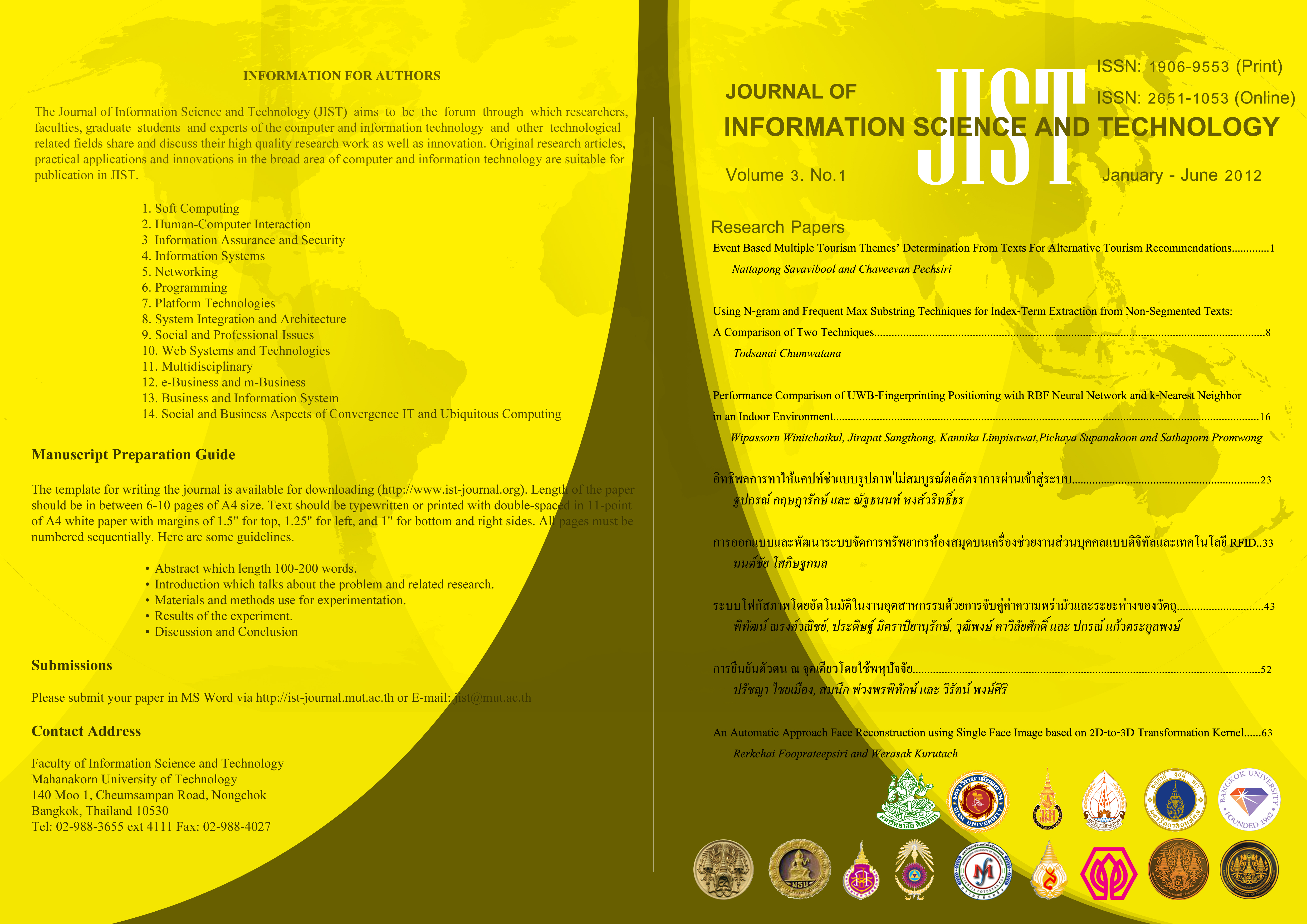Event Based Multiple Tourism Themes’ Determination From Texts For Alternative Tourism Recommendations
Main Article Content
Abstract
- This research aims to determine the multiple tourism themes based on attractiveness events expressed by the action verbs from the tourism web documents of the selected region. These several themes can be used for recommending tourists with alternative tourism theme choices. The problems of tourism themes’ acquisition from the web blog texts are to determine the touristic themes and to identify a touristic event base on a simple sentence or EDU Elementary Discourse Unit). This research proposes using the k-means clustering technique based on events expressed by verb phrases to determine the multiple tourism themes for a group of provinces within a region. Each cluster represents its own events while some of these events can be determined as the tourism themes by using verb-noun co-occurrences with the tourism event concepts. The result of the event-based tourism theme determination is evaluated by comparing to the answer set of the tourism highlight of each province provided by Tourism Authority of Thailand (http://thai.tourismthailand.org/), and our proposed methodology shows successfully results
Article Details
This work is licensed under a Creative Commons Attribution-NonCommercial-NoDerivatives 4.0 International License.
I/we certify that I/we have participated sufficiently in the intellectual content, conception and design of this work or the analysis and interpretation of the data (when applicable), as well as the writing of the manuscript, to take public responsibility for it and have agreed to have my/our name listed as a contributor. I/we believe the manuscript represents valid work. Neither this manuscript nor one with substantially similar content under my/our authorship has been published or is being considered for publication elsewhere, except as described in the covering letter. I/we certify that all the data collected during the study is presented in this manuscript and no data from the study has been or will be published separately. I/we attest that, if requested by the editors, I/we will provide the data/information or will cooperate fully in obtaining and providing the data/information on which the manuscript is based, for examination by the editors or their assignees. Financial interests, direct or indirect, that exist or may be perceived to exist for individual contributors in connection with the content of this paper have been disclosed in the cover letter. Sources of outside support of the project are named in the cover letter.
I/We hereby transfer(s), assign(s), or otherwise convey(s) all copyright ownership, including any and all rights incidental thereto, exclusively to the Journal, in the event that such work is published by the Journal. The Journal shall own the work, including 1) copyright; 2) the right to grant permission to republish the article in whole or in part, with or without fee; 3) the right to produce preprints or reprints and translate into languages other than English for sale or free distribution; and 4) the right to republish the work in a collection of articles in any other mechanical or electronic format.
We give the rights to the corresponding author to make necessary changes as per the request of the journal, do the rest of the correspondence on our behalf and he/she will act as the guarantor for the manuscript on our behalf.
All persons who have made substantial contributions to the work reported in the manuscript, but who are not contributors, are named in the Acknowledgment and have given me/us their written permission to be named. If I/we do not include an Acknowledgment that means I/we have not received substantial contributions from non-contributors and no contributor has been omitted.
References
2. L. Carlson, D. Marcu, and M.E. Okurowski, “Building a Discourse-Tagged Corpus in the Framework of Rhetorical Structure Theory,” In Current Directions in Discourse and Dialogue, pp. 85-112, 2003.
3. S. Loh, F. Lorenz, R. Saldana and D. Licthnow, “A tourism recommender system based on collaboration and text analysis,” Journal of Information Technology & Tourism, vol. 6, pp. 157–165, 2004.
4. Q. Mei, C. Zhai, “Discovering Evolutionary Theme Patterns from Text: an Exploration of Temporal Text Mining,” KDD '2005, 2005.
5. Q. Hao, R. Cai, C. Wang, R. Xiao, J. Yang, Y. Pang, and L. Zhang, “Equip Tourists with Knowledge Mined from Travelogues,” WWW '2010, 2010.
6. T. Kurashima, T. Tezuka. and Tanaka K, “Mining and Visualizing Local Experiences from Blog Entries,” DEXA’2006, 2006.
7. S. Sudprasert and A. Kawtrakul, “Thai Word Segmentation based on Global and Local Unsupervised Learning,” NCSEC’2003, 2003.
8. H. Chanlekha and A. Kawtrakul, “Thai Named Entity Extraction by incorporating Maximum Entropy Model with Simple Heuristic Information,” IJCNLP’2004, 2004.
9. J. Chareonsuk, T. Sukvakree and A. Kawtrakul, “Elementary Discourse unit Segmentation for Thai using Discourse Cue and Syntactic Information,” NCSEC’2005, 2005.
10. J. B. Macqueen, "Some Methods for classification and Analysis of Multivariate Observations," Proc. of 5th Berkeley Symposium on Mathematical Statistics and Probability, University of California Press, 1967.
11. K. V. Mardia, J. T. Kent and J. M. Bibby, Multivariate Analysis, Academic Press, 1979.


